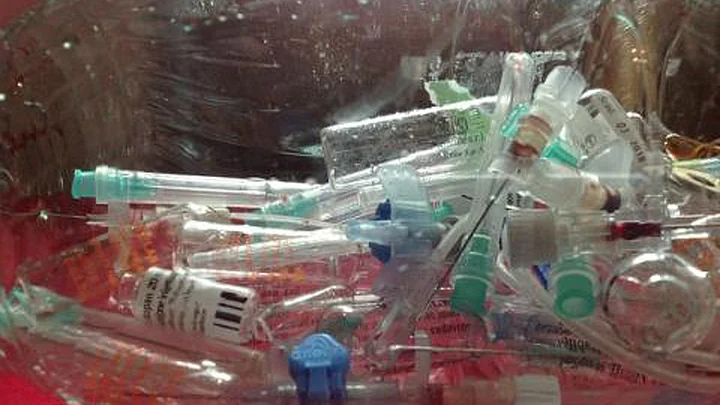K Chandraiah wheels in his trolley slowly as he makes his way towards the dumping area of the Gandhi hospital in Hyderabad. His trolley is full to the brim and he takes slow, steady steps to ensure that nothing spills.
Once he reaches his destination, he carefully segregates the wastes. Yellow bags are tossed in a stationary truck while black bags are disposed in the next truck.
“When anyone says hospital, many people only think about doctors and nurses and thank them. Without us, the entire place will collapse in a few days,” the 52-year-old chuckles.
How Much Waste Are We Dealing With?
According to the Pollution Control Board, there are 1,634 registered hospitals in Telangana, which generate a staggering 8.7 tonnes of medical waste every day. Out of this, close to seven tonnes is generated in Hyderabad’s 800-odd hospitals. It excludes the scores of private clinics and nursing homes that dot the city.
What Comes Under Bio-Medical waste?
The Bio-Medical Waste (Management and Handling) rules, 1998, classify waste into different categories, each with a specified method of disposal.
What is Supposed to Happen?
It is mandatory for hospitals dealing with more than 1,000 patients a month to tie up with bio-medical waste disposal companies.
Human anatomical waste such as body parts and issue removed during surgery, and other potentially contagious objects generated as waste, should be incinerated at 1,100º Celsius.
Plastic, rubber and glass disposables like gloves, bottles, syringes, tubes and urine bags are supposed to be sterilized and shredded.
Where Does Hyderabad’s Bio-Medical Waste Go?
Private clinics and nursing homes.
Dr Shankar, who runs a private clinic says there are other methods of disposal if you do not want to tie up with the firms
“The main things that have to be disposed in clinics are syringes, as no amount of boiling can kill some viruses like HIV.” The solution? A simple incinerator machine costing a few hundred rupees does the trick.
The tip of the syringe is put into a slot in the machine which burns it off. The glass body of the syringe is sterilized, then smashed and disposed of as regular municipal waste as it becomes harmless.
However, a lot of the smaller private clinics as well as nursing homes are known to throw their needles along with regular waste.
According to Dr Shankar, it is mostly due to lack of awareness. “Back in the 80’s, segregation was not done. Later, as more awareness was created, doctors started segregating and incinerating their waste. There is still a long way to go.”
Hospitals
Private hospital chains follow the colour code and train their waste handlers. Employees are also given face masks and gloves and the segregation is carried out in a separate area. A truck from the private firm collects the waste every evening to ensure proper disposal.
Government hospitals on the other hand, aren’t as thorough.
In the Gandhi hospital for example, body parts and other bio hazards generated from operation theatres are taken to a chemical chamber situated near the mortuary and incinerated.
The Result
Medical waste dumped along with other waste from households can pollute soil and water, and also affects ragpickers.
According to a study conducted in January 2014, many children run the risk of coming in contact with or even injured by needles, syringes, saline bottles, soiled gloves and other hospital wastes which they try to clean and resell in Hyderabad’s landfills.
This can cause respiratory problems, worms, anemia, fever etc.
Who is Responsible?
The Pollution Control Board is the agency entrusted with ensuring that the law is complied with.
In most of the hospitals, the disposal fault is not with the doctors but with the ward boys and nurses. Suppose, the PCB finds any defaulters, we take action depending on the degree of the fault.
—N Raveendhar, Senior Scientist with the Pollution Control Board
The PCB has an internal committee to record and review non-compliance with bio-medical waste disposal.
What Can Be Done
The government set up the National Accreditation Board for Hospitals and Healthcare (NABH) in 2006 to accredit health care providers on quality. Ranking parameters include bio-medical waste disposal.
The NABH is said to come down hard on private hospitals and go easy on government hospitals.
According to A V Ratnam, President of Parirakshana, a hospital management consultancy that trains employees in handling waste, the problem is dual – the PCB lacks commitment, and the government is reluctant to release separate funds.
The act is there, but only on paper. The entire thing is lost in bureaucracy and pointing fingers.
— A V Ratnam, President of Parirakshana, a hospital management consultancy
(Nitin B works with The News Minute.)
